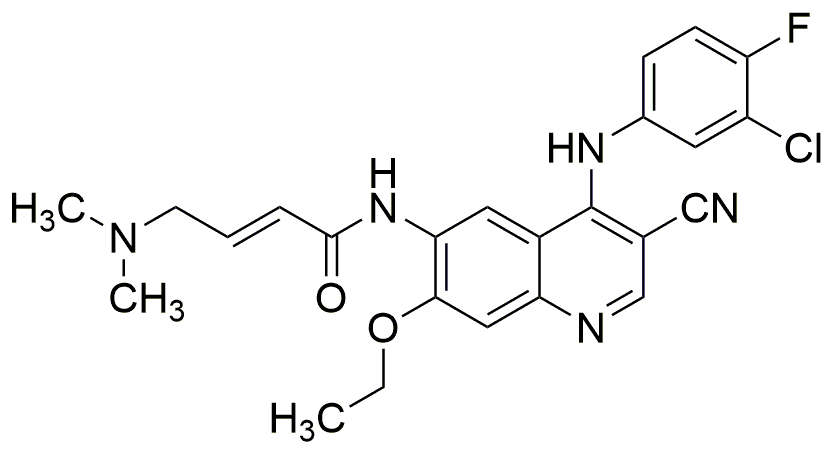Pelitinib is widely utilized in research focused on:
- Cancer Treatment: Pelitinib is primarily studied for its potential in treating various types of cancer, particularly non-small cell lung cancer (NSCLC). Its targeted action on specific cancer cell pathways makes it a promising candidate for personalized medicine.
- Drug Development: Researchers are exploring Pelitinib as a lead compound for developing new anti-cancer drugs. Its unique structure allows for modifications that can enhance efficacy and reduce side effects compared to traditional chemotherapy agents.
- Combination Therapies: Pelitinib is being investigated in combination with other therapies to improve treatment outcomes. This approach can help overcome resistance mechanisms that often limit the effectiveness of single-agent treatments.
- Biomarker Research: The use of Pelitinib in clinical studies is aiding the identification of biomarkers that predict patient responses to treatment, which is crucial for optimizing therapy and improving patient outcomes.
- Pharmacokinetic Studies: Pelitinib's pharmacokinetic profile is being analyzed to understand its absorption, distribution, metabolism, and excretion in the body, providing valuable information for dosage optimization and safety assessments.
General Information
Properties
Safety and Regulations
Applications
Pelitinib is widely utilized in research focused on:
- Cancer Treatment: Pelitinib is primarily studied for its potential in treating various types of cancer, particularly non-small cell lung cancer (NSCLC). Its targeted action on specific cancer cell pathways makes it a promising candidate for personalized medicine.
- Drug Development: Researchers are exploring Pelitinib as a lead compound for developing new anti-cancer drugs. Its unique structure allows for modifications that can enhance efficacy and reduce side effects compared to traditional chemotherapy agents.
- Combination Therapies: Pelitinib is being investigated in combination with other therapies to improve treatment outcomes. This approach can help overcome resistance mechanisms that often limit the effectiveness of single-agent treatments.
- Biomarker Research: The use of Pelitinib in clinical studies is aiding the identification of biomarkers that predict patient responses to treatment, which is crucial for optimizing therapy and improving patient outcomes.
- Pharmacokinetic Studies: Pelitinib's pharmacokinetic profile is being analyzed to understand its absorption, distribution, metabolism, and excretion in the body, providing valuable information for dosage optimization and safety assessments.
Documents
Safety Data Sheets (SDS)
The SDS provides comprehensive safety information on handling, storage, and disposal of the product.
Product Specification (PS)
The PS provides a comprehensive breakdown of the product’s properties, including chemical composition, physical state, purity, and storage requirements. It also details acceptable quality ranges and the product's intended applications.
Certificates of Analysis (COA)
Search for Certificates of Analysis (COA) by entering the products Lot Number. Lot and Batch Numbers can be found on a product’s label following the words ‘Lot’ or ‘Batch’.
*Catalog Number
*Lot Number
Certificates Of Origin (COO)
This COO confirms the country where the product was manufactured, and also details the materials and components used in it and whether it is derived from natural, synthetic, or other specific sources. This certificate may be required for customs, trade, and regulatory compliance.
*Catalog Number
*Lot Number
Safety Data Sheets (SDS)
The SDS provides comprehensive safety information on handling, storage, and disposal of the product.
DownloadProduct Specification (PS)
The PS provides a comprehensive breakdown of the product’s properties, including chemical composition, physical state, purity, and storage requirements. It also details acceptable quality ranges and the product's intended applications.
DownloadCertificates of Analysis (COA)
Search for Certificates of Analysis (COA) by entering the products Lot Number. Lot and Batch Numbers can be found on a product’s label following the words ‘Lot’ or ‘Batch’.
*Catalog Number
*Lot Number
Certificates Of Origin (COO)
This COO confirms the country where the product was manufactured, and also details the materials and components used in it and whether it is derived from natural, synthetic, or other specific sources. This certificate may be required for customs, trade, and regulatory compliance.


